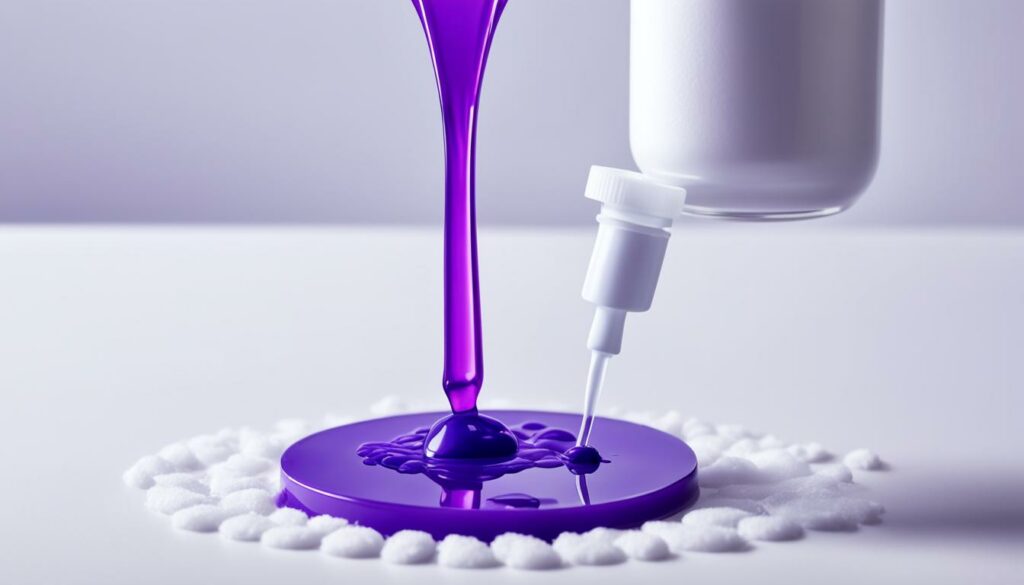Welcome to our article on gentian, a versatile herb that has been used for centuries in traditional medicine. In this comprehensive guide, we will explore the various gentian uses and uncover the health benefits of gentian that have made it a popular choice among those seeking natural remedies for their well-being.
Gentian root, known for its therapeutic properties, has been incorporated into a variety of gentian herbal supplements and traditional medicinal practices. Whether you are looking to support your digestion, enhance liver health, or enjoy the calming effects of gentian tea, this article has you covered.
Let’s delve into the gentian root benefits and explore how this remarkable herb has found its place in the world of holistic wellness. Read on to discover the rich history of gentian in traditional medicine, its potential as a gentian supplement for digestion, and its role in promoting gentian for liver health.
What is Gentian Root?
Gentian root, derived from the flowering plants of the Gentiana genus, has been used for medicinal purposes for centuries. It is known for its bitter taste and can be dried and made into various forms such as pills, teas, tinctures, and extracts. In traditional medicine, gentian root is often utilized as a digestive tonic to stimulate the stomach, liver, and gallbladder, promoting healthy digestion. Additionally, it has been historically employed to stimulate appetite and aid in the digestive process.

| Forms of Gentian Root: | Medicinal Purposes: |
|---|---|
| Pills | Stimulate appetite |
| Teas | Stimulate digestion |
| Tinctures | Digestive tonic |
| Extracts | Traditional medicine |
Possible Benefits of Gentian Root
Gentian root is believed to offer several potential health benefits due to the presence of compounds such as iridoids, secoiridoids, xanthones, and flavonoids. These natural components contribute to the herb’s therapeutic properties, making it a promising option for various health conditions.
Anti-Inflammatory Properties
Scientific studies have indicated that gentian root possesses anti-inflammatory properties, which can be valuable in managing conditions like arthritis. Inflammation plays a significant role in the development and progression of arthritis, and the anti-inflammatory effects of gentian root may help reduce pain and swelling associated with the disease.
Support for Sinus Infections
Gentian root has also been explored for its potential role in treating sinus infections. Its anti-inflammatory effects may help alleviate nasal congestion, reduce sinus inflammation, and relieve discomfort caused by sinus infections. By addressing the underlying inflammation, gentian root can provide relief and support sinus health.
Digestive Aid and Appetite Stimulation
Gentian root is widely recognized as a digestive aid. It stimulates the production of digestive enzymes, enhances gastric acid secretion, and promotes the overall function of the gastrointestinal system. This makes it an effective natural remedy for improving digestion and alleviating digestive issues such as indigestion, bloating, and gastrointestinal discomfort.
Furthermore, gentian root is known for its ability to stimulate appetite. It activates the gustatory receptors on the tongue, which triggers the release of saliva and signals the brain to increase appetite. This makes gentian root particularly beneficial for individuals with poor appetite or those recovering from illnesses.

Overall, gentian root offers a range of potential health benefits, including its anti-inflammatory properties for arthritis, support in treating sinus infections, and its role as a digestive aid and appetite stimulant. While further research is necessary to fully understand and validate these benefits, gentian root remains a popular herb in traditional medicine for its holistic approach to improving wellness.
Downsides of Gentian Root
While gentian root has been used for centuries in traditional medicine, there is a lack of research on its potential side effects and safety concerns. As a result, the documentation on these aspects is not extensive or well-documented.
Some individuals may experience adverse reactions to gentian root, and caution should be exercised, especially for certain groups. Children, pregnant and lactating women, and individuals taking blood pressure medications should avoid the use of gentian root supplements due to potential interactions and safety concerns.
It is crucial to consult with a healthcare provider before considering the use of gentian root supplements. They can provide personalized guidance based on your specific medical history, current medications, and individual circumstances to ensure your safety and well-being.

Interactions with Blood Pressure Medications
| Medication | Potential Interaction |
|---|---|
| ACE inhibitors (e.g., Lisinopril, Enalapril) | Gentian root may lower blood pressure further when taken concurrently, potentially leading to excessively low blood pressure levels. |
| Beta-blockers (e.g., Metoprolol, Atenolol) | Combining gentian root with beta-blockers can enhance the blood pressure-lowering effect, causing an excessive drop in blood pressure. |
| Calcium channel blockers (e.g., Amlodipine, Diltiazem) | Gentian root may enhance the blood pressure-lowering effect of calcium channel blockers, leading to a further decrease in blood pressure levels. |
| Diuretics (e.g., Hydrochlorothiazide, Furosemide) | The combination of gentian root and diuretics may increase the risk of dehydration, electrolyte imbalances, and low blood pressure levels. |
Dosage and Forms of Gentian Root
When it comes to using gentian root as a supplement, the dosage and forms can vary. It’s important to note that there is no standardized dosage for gentian root, so the recommended amounts may differ based on the specific supplement and its intended use.
Forms of gentian root:
- Liquid extracts
- Pills
- Teas
Each form of gentian root may have different instructions for use. It’s crucial to carefully read and follow the product labels for guidance on dosage and administration.
When considering the dosage of gentian root, it’s vital to be aware of supplement regulations. Unlike medications, supplement regulations are not as strict, and the accuracy of supplement labels may not always be guaranteed. Therefore, it’s advisable to consult a healthcare provider before using gentian root supplements to ensure the appropriate dosage and usage.

The Bottom Line on Gentian Root
Gentian root, with its bitter taste, has been utilized for centuries in traditional medicine for various purposes. While the scientific evidence supporting its potential health benefits is limited, some research suggests that gentian root may possess anti-inflammatory properties and could be effective in addressing conditions like arthritis and sinus infections. It is also commonly used as a natural remedy for digestion support and liver health. However, before incorporating gentian root into your wellness routine, it is important to consult with a healthcare provider to ensure it is suitable for you.
Although scientific studies are scarce, gentian root has long been appreciated in traditional medicine for its potential holistic wellness benefits. While further research is needed to validate these claims, gentian root is believed to possess anti-inflammatory properties that could be beneficial in managing conditions such as arthritis and sinus infections. Additionally, gentian root is commonly used to support healthy digestion and promote liver health. However, it is important to note that scientific evidence supporting its use is currently limited, and consultation with a healthcare provider is recommended before incorporating gentian root into your regimen.

Gentian Violet and Medical Uses
Gentian violet and chlorhexidine (CHX) have various medical uses, particularly in coating medical devices such as central venous catheters, urinary catheters, and endotracheal tubes. The purpose of these coatings is to prevent infections associated with the use of these devices.
Gentian violet, derived from coal tar, is a purple dye used in medical settings. It is important to note that the use of gentian violet in medicine is not related to the herb Gentiana.
Although cases of cystitis have been reported due to the intravesical installation of gentian violet, the adverse effects of using gentian violet as a medical coating are generally minor.
| Medical Device | Uses of Gentian Violet Coating |
|---|---|
| Central venous catheters | Prevents infections associated with their use |
| Urinary catheters | Prevents infections associated with their use |
| Endotracheal tubes | Prevents infections associated with their use |
Despite the reported cases of cystitis, gentian violet is generally well-tolerated as a medical coating. However, it is essential to consult with a healthcare professional before using gentian violet-coated medical devices.

Gentian Violet in Sensory Systems
Gentian violet, a purple dye derived from coal tar, has been utilized as a corneal stain in sensory systems. Although there have been cases of corneal and conjunctival abrasions associated with its use, the adverse effects of gentian violet as a corneal stain are generally minor. Overall, it has shown to be relatively safe, but caution should be exercised when using this dye in the eyes to prevent potential complications.
Inadvertent instillation of gentian violet has been associated with keratoconjunctivitis sicca, a condition characterized by dryness and inflammation of the cornea and conjunctiva. Therefore, it is important to use gentian violet in sensory systems with care and follow proper guidelines to minimize the risk of adverse effects.

Gentian Violet in Bacteriology
Gentian violet is a versatile tool in bacteriology, offering various applications and effects. In broth media, it serves as a valuable method for eliminating aerobic spore-forming bacilli from anaerobic cultures. However, it’s important to note that while gentian violet can effectively target these aerobic bacteria, its inhibitory effects may also hinder the growth of certain anaerobes, leading to limitations in its usage. Furthermore, in plate cultures, gentian violet has been utilized for the isolation of fusobacteria. Nevertheless, the effectiveness of gentian violet can vary based on the specific strains of bacteria and concentrations employed.
| Gentian Violet in Bacteriology | Inhibitory Effects | Anaerobes |
|---|---|---|
| Eliminating aerobic spore-forming bacilli from anaerobic cultures | May hinder growth of some anaerobic bacteria | Varies based on specific strains and concentrations |
| Utilized in plate cultures for the isolation of fusobacteria |
Other Uses and Considerations for Gentian
Gentian root is not the only form of gentian that has various applications. Another notable use of gentian is seen in the form of gentian violet, which is commonly employed as a staining solution in laboratory settings.

In addition to staining solutions, the bitter taste of gentian root has made it a popular ingredient in bitters. Bitters are consumed before or after meals to stimulate digestion, and the inclusion of gentian root contributes to their effectiveness.
Furthermore, gentian root possesses anti-inflammatory properties, making it useful in wound healing. It aids in reducing inflammation and promoting the body’s natural healing processes.
Moreover, studies have shown that gentian root has the ability to provide pain relief by modulating pain pathways in the brain, offering a potential natural solution for managing discomfort.
Conclusion
Gentian root, with its long history in traditional medicine, offers potential benefits for holistic wellness. Although scientific research on its uses is limited, gentian root’s anti-inflammatory properties, digestion support, and liver health benefits have been valued over the years. However, caution is necessary as its safety and standardized dosage remain uncertain. It is advisable to consult a healthcare provider before considering gentian root supplements to ensure personalized guidance and to minimize potential risks.
In the realm of holistic wellness, gentian root has been recognized for its anti-inflammatory properties, making it a possible natural remedy for various health concerns. It has also been traditionally used to support digestion and promote liver health. However, due to the lack of research, it’s essential to exercise caution when considering gentian root as part of your wellness routine.
As with any herbal supplement, it is important to consult a healthcare provider before incorporating gentian root into your wellness regimen. They will be able to provide personalized guidance based on your health history, potential drug interactions, and any specific concerns you may have. By working closely with a healthcare professional, you can ensure a holistic approach to your wellness journey with gentian root and make informed decisions that prioritize your well-being.
FAQ
What is gentian root?
Gentian root is the root of the Gentiana genus, a group of flowering plants. It is commonly used for medicinal purposes and is known for its bitter taste.
What are the possible benefits of gentian root?
Gentian root is believed to have anti-inflammatory properties and may be beneficial for conditions such as arthritis and sinus infections. It is also commonly used as a digestive aid and for stimulating the appetite.
Are there any downsides to using gentian root?
The research on gentian root is limited, making the potential side effects and safety concerns unclear. Certain individuals, such as children, pregnant and lactating women, and those taking blood pressure medications, should avoid the use of gentian root.
What is the recommended dosage and forms of gentian root?
There is no standardized dosage for gentian root, and the recommended amounts may vary depending on the form of the supplement. It is important to consult with a healthcare provider before using gentian root supplements.
What other uses are there for gentian root?
Gentian root is also used as a staining solution in laboratory settings and as an ingredient in bitters, which are consumed before or after meals to aid digestion. It is believed to have wound healing properties and can provide relief from pain.
What is gentian violet and what are its medical uses?
Gentian violet is a purple dye derived from coal tar. It has been used to coat medical devices, such as central venous catheters and urinary catheters, to prevent infections associated with their use.
Can gentian violet be used in the eyes?
Gentian violet has been used as a corneal stain, but there can be minor adverse effects. It should be used with caution, as keratoconjunctivitis sicca has been reported after its inadvertent instillation.
How is gentian violet used in bacteriology?
Gentian violet has been used in broth media to eliminate aerobic spore-forming bacilli from anaerobic cultures. However, its inhibitory effects may also hinder the growth of some anaerobic bacteria. It has also been used in plate cultures for the isolation of fusobacteria.
Are there any other considerations for using gentian?
Gentian root is commonly used in traditional medicine for various purposes. It is believed to have potential benefits for holistic wellness, including digestion support and liver health. However, it is important to exercise caution as its safety and standardized dosage are not well-documented. Consulting with a healthcare provider is advised.

